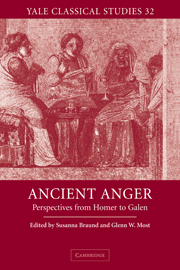Book contents
- Frontmatter
- Contents
- Notes on contributors
- Acknowledgments
- List of abbreviations
- Introduction
- Chapter 1 Ethics, ethology, terminology: Iliadic anger and the cross-cultural study of emotion
- Chapter 2 Anger and pity in Homer's Iliad
- Chapter 3 Angry bees, wasps, and jurors: the symbolic politics of ὀργή in Athens
- Chapter 4 Aristotle on anger and the emotions: the strategies of status
- Chapter 5 The rage of women
- Chapter 6 Thumos as masculine ideal and social pathology in ancient Greek magical spells
- Chapter 7 Anger and gender in Chariton's Chaereas and Callirhoe
- Chapter 8 “Your mother nursed you with bile”: anger in babies and small children
- Chapter 9 Reactive and objective attitudes: anger in Virgil's Aeneid and Hellenistic philosophy
- Chapter 10 The angry poet and the angry gods: problems of theodicy in Lucan's epic of defeat
- Chapter 11 An ABC of epic ira: anger, beasts, and cannibalism
- References
- Index of passages cited
- Index of proper names
- Index of topics
Chapter 4 - Aristotle on anger and the emotions: the strategies of status
Published online by Cambridge University Press: 22 September 2009
- Frontmatter
- Contents
- Notes on contributors
- Acknowledgments
- List of abbreviations
- Introduction
- Chapter 1 Ethics, ethology, terminology: Iliadic anger and the cross-cultural study of emotion
- Chapter 2 Anger and pity in Homer's Iliad
- Chapter 3 Angry bees, wasps, and jurors: the symbolic politics of ὀργή in Athens
- Chapter 4 Aristotle on anger and the emotions: the strategies of status
- Chapter 5 The rage of women
- Chapter 6 Thumos as masculine ideal and social pathology in ancient Greek magical spells
- Chapter 7 Anger and gender in Chariton's Chaereas and Callirhoe
- Chapter 8 “Your mother nursed you with bile”: anger in babies and small children
- Chapter 9 Reactive and objective attitudes: anger in Virgil's Aeneid and Hellenistic philosophy
- Chapter 10 The angry poet and the angry gods: problems of theodicy in Lucan's epic of defeat
- Chapter 11 An ABC of epic ira: anger, beasts, and cannibalism
- References
- Index of passages cited
- Index of proper names
- Index of topics
Summary
In an undergraduate class to which I had assigned the second book of Aristotle's Rhetoric (in translation), I asked the students each to draw up a list of ten emotions. It was remarkable how small an overlap there was between their inventories and the passions analyzed by Aristotle. Anger was prominent in both sets, but beyond that, there was little agreement. Among the emotions suggested by the students which do not figure in Aristotle's discussion were grief, sorrow, sadness, happiness, jealousy, missing someone, and loneliness. None of the students, on the other hand, mentioned pity, envy, indignation, shame, gentleness, confidence, rivalry, or gratitude. The difference between Aristotle's catalogue and the composite set assembled from my students' lists is indicative of two very different points of view on the passions. It also suggests that even in the case of anger, where both rosters dovetailed, Aristotle's conception is likely to diverge substantially from what our own intuitions might suggest.
In this paper, I examine in detail Aristotle's account of anger, which in fact is quite foreign, in many ways, to modern notions. This first part is necessarily the most technical. Following that, I attempt to situate Aristotle's treatment of anger in the context of his understanding of the passions in general, and I conclude by considering how Aristotle's interpretation of anger relates to his treatment of other passions that are included in his survey.
- Type
- Chapter
- Information
- Ancient AngerPerspectives from Homer to Galen, pp. 99 - 120Publisher: Cambridge University PressPrint publication year: 2004
- 4
- Cited by

